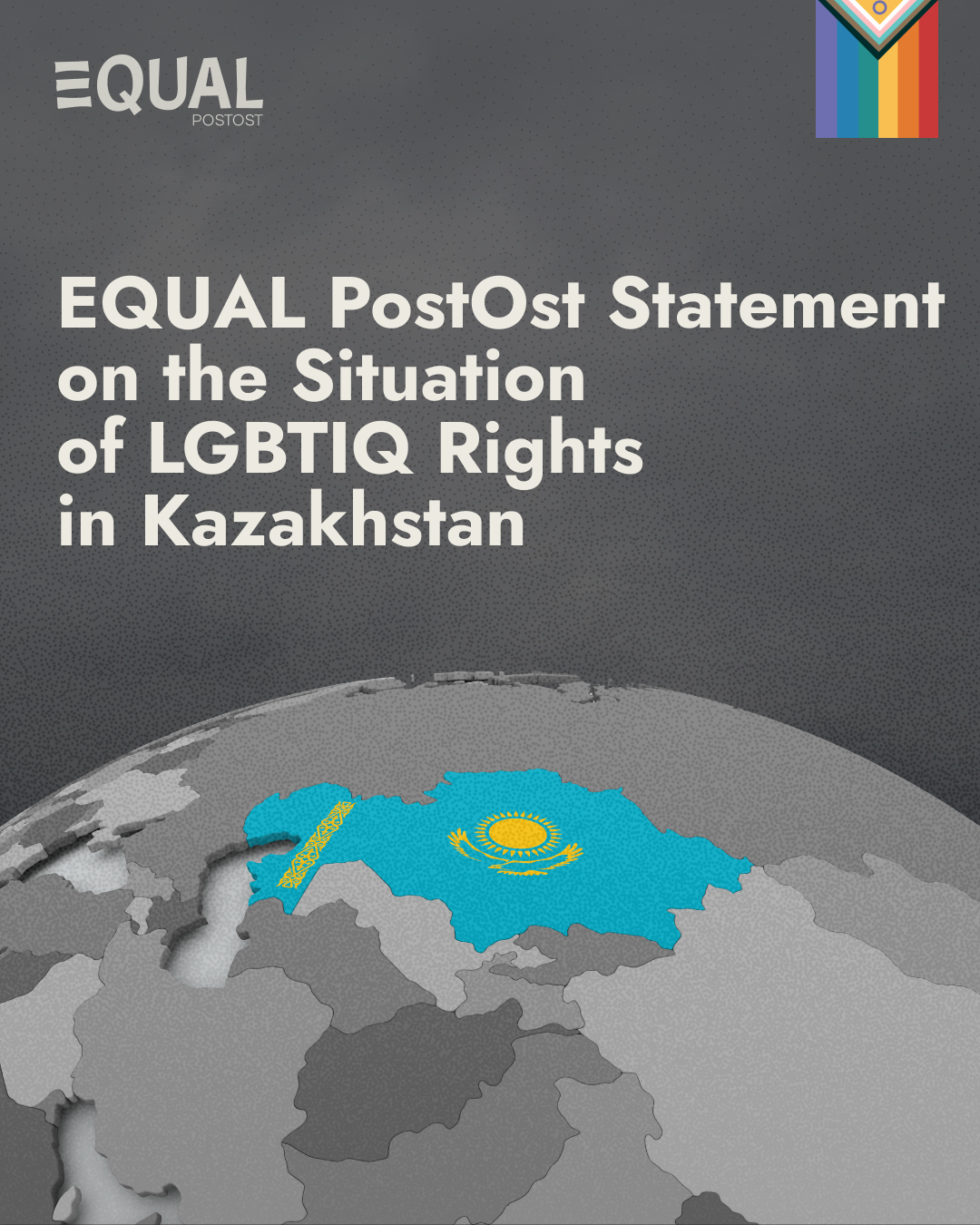17 November 2025
EQUAL PostOst calls for heightened attention to recent developments in Kazakhstan, where discriminatory amendments targeting the LGBTIQ community were introduced into the Law “On Amendments and Additions to Certain Legislative Acts of the Republic of Kazakhstan on the Protection of Children from Information Harmful to Their Health and Development”. These amendments were adopted on 12 November 2025 without transparent deliberation and without the participation of civil society.
During closed discussions, the bill was supplemented with provisions that effectively criminalize so-called “propaganda of non-traditional sexual orientation” and equate LGBTIQ identities with a threat to children.
What Happened
Our partners in Kazakhstan confirm that neither activists nor human rights organizations were granted access to the text of the amendments or an opportunity to present their positions. According to the available materials, the parliamentary working group proposed:
-
introducing administrative liability for “propaganda of non-traditional sexual orientation”, including fines of up to 157,000 tenge (approximately €260) or up to 10 days of arrest;
-
adopting an extremely broad definition of “propaganda”, encompassing any public mention, positive portrayal, or expression of support for LGBTIQ people;
-
amending at least nine laws — on child rights, advertising, culture, education, media, communications, online platforms, and others — thereby enabling censorship, blocking, and arbitrary restrictions.
To justify these measures, the authorities relied on a non-public and unscientific “study” produced by a government-affiliated NGO, which was presented as an analytical basis for the amendments. Government bodies in attendance at the briefing refused to disclose the materials, claiming they “do not constitute state information”.
Our Concerns
Lack of transparency and violations of procedure
The amendments were introduced and voted on during closed sessions without publication of the text. A group of MPs prepared revisions that were read aloud during the working group session on 29 October, yet the official document has still not been published. This contradicts the principles of openness and legislative transparency.
Disinformation and stigmatization
During the plenary session, several MPs used rhetoric portraying LGBTIQ people as a threat to children and as “undermining values”. Such narratives fuel hostility and violence.
Contradiction with international and constitutional obligations
The amendments violate the Constitution of Kazakhstan, the International Covenant on Civil and Political Rights, the Convention on the Rights of the Child, and Kazakhstan’s commitments to the European Union regarding adherence to fundamental human rights. Notably, in 2015 the Constitutional Council of Kazakhstan had already ruled similar provisions unconstitutional.
Risk of selective enforcement and pressure on civil society
If adopted in final form, the amendments may lead to restrictions on the work of NGOs, persecution of activists and human rights defenders, increased censorship in media, culture, and education, blocking of online resources, and a rise in societal hostility and violence against LGBTIQ people. In our assessment, these measures reflect a dangerous trend of replicating the Russian model of repressive legislation — a model that similarly began “for the protection of children” but has since resulted in criminal cases, prison sentences, deaths, and widespread violence against those who do not conform to so-called “traditional values”.
Our Solidarity with Communities in Kazakhstan
We stand in solidarity with all human rights, feminist, LGBTIQ, and civic initiatives that continue their work despite pressure and risks. Their efforts to protect the dignity, rights, and safety of individuals are an essential part of the country’s civic space.
Our Demands
To the Senate and the President of the Republic of Kazakhstan
-
Reject the discriminatory amendments. Protecting the rights and dignity of all citizens is a constitutional obligation of the state and cannot be undermined under the pretext of “traditional values”
To the European Union and EU Member States
-
Act without delay. Diplomatic silence will be perceived as acceptance of the ongoing developments.
-
Issue a public statement. We call on the European Union and its Member States to issue a clear declaration condemning the discriminatory amendments and calling for their rejection, emphasizing the inadmissibility of measures that effectively restrict freedom of expression and open references to LGBTIQ people.
-
Establish emergency assistance mechanisms. Implement effective channels to ensure that LGBTIQ individuals and human rights defenders at risk can access expedited visa procedures, humanitarian protection, and relocation pathways.
To the International Community — the United Nations, the OSCE, and Diplomatic Missions
-
Demand transparency. The full text of the amendments must be published, and the discussion process must be open to civil society and international expertise.
-
Request official clarification. State authorities must explain how the amendments comply with Kazakhstan’s constitutional guarantees and international human rights obligations.
-
Initiate an independent legal review. The compatibility of the amendments with Kazakhstan’s Constitution and international law should be examined by reputable legal institutions.
-
Ensure protection of human rights defenders. Enhanced monitoring and practical support mechanisms are essential for those documenting violations and facing persecution.
Neighboring countries’ experience demonstrates that such laws often become the first step toward widespread repression against civil society. As a sovereign, lawful, and democratic state, Kazakhstan must not follow this trajectory.
Human rights are the foundation of any democratic and developed society.
We expect decisive action from all relevant actors.
